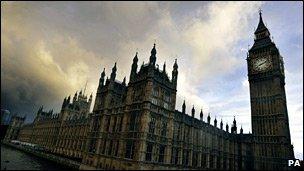Tensions over the future of MPs' expenses body Ipsa
- Published
The new Parliamentary expenses watchdog Ipsa has never been particularly popular among MPs, with the prime minister giving it until April to "sort itself out". As tensions grow it has launched an a review of its rules and wants the public to give their views.
The Independent Parliamentary Standards Authority (Ipsa) was formed in May 2010 to implement tougher rules governing MPs allowances in the wake of the expenses scandal.

The new regime was brought in after the MP expenses scandals of 2009
But since its formation, MPs have complained that Ipsa has imposed excessive administrative burdens on them, which wastes the time of their staff, who should be looking after the needs of their constituents rather than the needs of the authority. In some cases MPs say they have been left unable to pay their staff because claims take Ipsa so long to process.
One of those who thinks the system needs a complete overhaul is the Liberal Democrat MP Bob Russell.
"I think in its present form it should be scrapped frankly because it is not fit for purpose. In fact I'd go as far as to say it is the worst organisation I have had to deal with in 40 years of public life."
The Conservative MP Roger Gale echoes this sentiment, saying that the system implemented by Ipsa "does not work and those responsible have got to be replaced".
The man at the centre of the storm, Sir Ian Kennedy, says his critics represent only around ten per cent of MPs, and that the system is working.
"For the first few weeks we had teething troubles, you would expect that. But gradually and increasingly successfully I think we've been able to deliver the goods.
"We're paying expenses to MPs and their staff, we're revising the rules whenever they need to be looked at, and now we're launching a major consultation."
In December Ipsa published the expenses claims made by MPs in the three months following the general election. It showed that total expenses amounted to £3.1 million, with accommodation amounting to the highest amount. Sir Ian Kennedy says the publication proves that the system is working.
"We have only to look at the recent evidence of publication of expenses to show that the system is working. MPs are behaving entirely responsibly."
And Sir Ian is certainly not considering tendering his resignation any time soon.
"We're here for the long haul, it's not an immediate quick fix. This is a process whereby we are... helping to bring about a reorientation of trust in our democratic institutions."
The review will look at how Ipsa rules affect family life; accommodation rules for London MPs; and the cost of staffing and renting a constituency office. Sir Ian insists that there is no need for radical change but the Labour MP David Winnick warns that without it, Ipsa's days could be numbered.
"The patience of members of parliament will meet such a state that inevitably there will be changes which could mean the abolition of Ipsa. It is up to Ipsa, if they can reform then it's quite likely Ipsa could continue."
The Conservative MP Nadine Dorries led the criticism of Ipsa that prompted David Cameron's insistence on reform. She agrees with David Winnick that Ipsa must heed the Prime Minister's warning and drastically change the way it operates: "If Ipsa don't sort this, then Ipsa will be sorted."
Sir Ian Kennedy thinks MPs simply need time to adjust to the new, more stringent system, and that perhaps some are hankering after the old days. And yet there is a sense that the tide is now running strongly against Ipsa.
What may yet save it is the fear among many MPs of the likely public backlash should they seek to replace it or its chairman.
And yet so angry are some MPs, that it appears they are willing to take that risk.
- Published15 December 2010
- Published2 December 2010
- Published2 December 2010
- Published1 December 2010